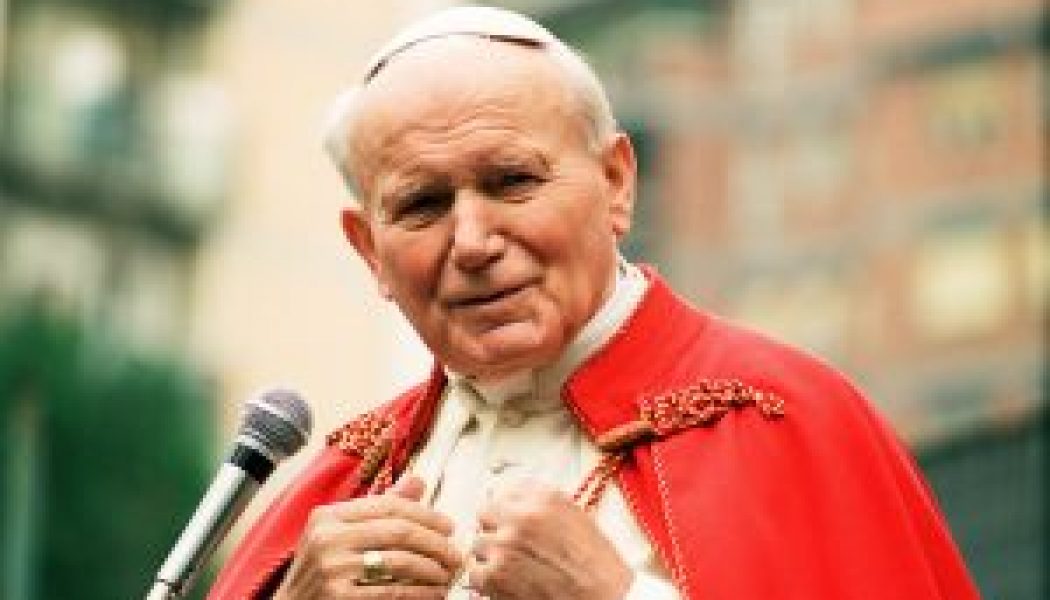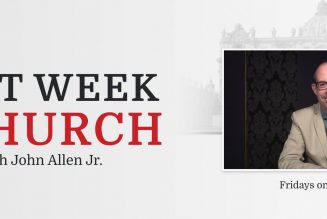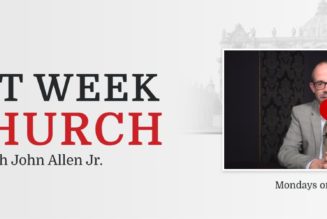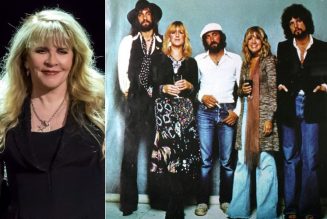“We believe in the Holy Spirit, the Lord, the giver of life.”
It’s a line we proclaim during the Nicene Creed, a prayer that is still very much a part of Mass whether online or with social distancing measures, in 2020.
Don’t we need life, and don’t we need the presence of its Giver more than ever right now?
So many of us have experienced an abrupt change in our lives. Many of us have lost loved ones, jobs, or even homes. The source and summit of our Christian lives, the Eucharist, has been transmitted through a screen, that place where so much of our lives has been increasingly conducted, connecting us and yet isolating us, too, even creating a seemingly unnecessary epidemic of loneliness and despair.
Some of that truly present sacramental life is being restored with new protocols in some dioceses around the country, but not for others yet. My heart wants to rejoice for those who can, and yet the longing and need is great. What a gift it was when daily Mass was a thing for many of us!
And so, even with all the restrictions and changing circumstances, on May 31 this year we celebrate the birthday of the Church. Some of us who have celebrated birthdays in quarantine can relate to the strangeness of it. And yet for others, surrounded by loved ones, maybe it is restorative, an occasion of gratitude for the most important gifts there are: faith, hope, and love, given to us by a heavenly Father who sent his only Son to destroy death.
When St. Pope John Paul II returned to his native Poland in 1979 for the first time since becoming pope, he did so for Pentecost, when he declared that Christ is “the key to understanding that great and fundamental reality that is man.”
“Man cannot be fully understood without Christ,” continued St. John Paul in his Pentecost homily in Warsaw. “Or rather, man is incapable of understanding himself fully without Christ. He cannot understand who he is, nor what his true dignity is, nor what his vocation is, nor what his final end is. He cannot understand any of this without Christ.”
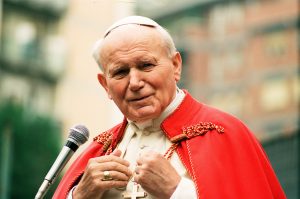
Pope John Paul II in 1996. (© L’Osservatore Romano)
If this is true, then we can confidently turn to Christ in our confusion and agony, and find a source of light to illuminate it. Things start to make sense again, even in the anger and fear that surrounds us so much, perhaps manifested today in what we see in the media and experience in the physical hesitations as we greet one another through facemasks and social distance.
In the same homily, the late saint said that “Christ cannot be kept out of the history of man in any part of the globe, at any longitude or latitude of geography.
“The history of the nation is above all the history of people. And the history of each person unfolds in Jesus Christ. In him it becomes the history of salvation.”
We have seen all too well how quickly he can be pushed to the sidelines in a crisis like this one. The governor of New York even made a point of insisting that God wasn’t responsible for successes in avoiding some of the worst-case coronavirus (COVID-19) scenarios feared in his state.
But we know better, don’t we? We believe what we say we do? Or has this coronavirus exposed our unbelief?
The Catholic Church, St. John Paul said in that 1979 Pentecost homily, “has proclaimed since the earliest centuries her faith in the Holy Spirit, as the giver of life, the one in whom the inscrutable Triune God communicates himself to human beings, constituting in them the source of eternal life.”
As so many of us have missed being present at the Mass, of having the help of the sacraments in drawing closer to the source of eternal life, how can we live the Trinitarian life in more loving and radical ways? Can we ask ourselves these questions this Pentecost and help one another truly live this feast as members of the body of Christ, the Church in the world?
If we look to the cross and see the love of God in the most transparent way, could the Holy Spirit lift us up in ways we didn’t know were possible in our human weakness? As we have gotten a better look at our human weaknesses during a time of so many restrictions, can we pray like perhaps we have before for a new Pentecost in the world and in our lives?
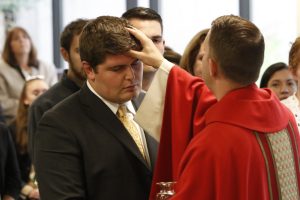
James Trull is anointed with sacred chrism by campus chaplain Father Gregory Rannazissi during his confirmation in 2016 at Hofstra University in Hempstead, N.Y. (CNS photo/Gregory A. Shemitz)
This “birthday” of the Church can mark a new year, a new moment to let the Holy Spirit into the Church. A good start might be to pray with all our hearts, “Come, Holy Spirit!” We can also add to that a meditation on the gifts of the Holy Spirit, like wisdom, fortitude, counsel. Those are gifts we can receive like never before, whatever our access to the Eucharist looks like.
Our hearts and souls cannot afford to miss the lesson of this time of the coronavirus. We don’t have a lot of time, you and I, to live the life of love we are called to as Christians. By the choices we make today, and the capacity in which the Holy Spirit can find a home in us, the renewal of the face of the earth can happen. That new Pentecost will be seen as we reopen our lives to the power of the Holy Spirit.
“In our own age, then, we are called anew by the ever ancient and ever new faith of the Church, to draw near to the Holy Spirit as the giver of life,” St. John Paul wrote in his 1986 encyclical “On the Holy Spirit in the Church and the World.” It might as well have been written today, as a Pentecost reminder to us all. Let’s go for it!
